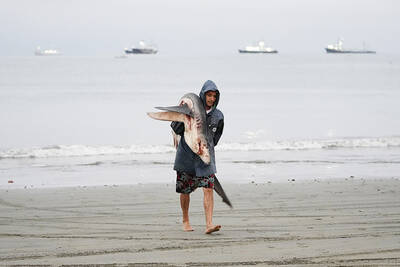Lebanese psychic Ali Sibat had just woken from an afternoon nap in a Saudi hotel when the telephone rang. A Saudi man asked if he could make a magical talisman for his sister, who had marital problems. Sibat, in the kingdom on a pilgrimage, said he’d be happy to help.
As soon as he hung up, religious police stormed into his room and arrested him for witchcraft. Now Sibat is on death row, sentenced to be beheaded.
His arrest in 2008 and sentencing the following year has devastated Sibat’s family in the eastern Lebanese village of al-Ain, who have been struggling to win his release. Last week, they were hit by the news that his execution was scheduled for that Friday, April 2.
His 19-year-old son had a violent seizure from the shock and remains in a hospital. His 15-year-old daughter was thrown into depression and could not go to school. In the end, the execution did not take place, but the family remains in fear.
“It was a shock to all of us,” said Sibat’s wife, Samira Rahmoon, 46. “We’re all dying a slow death.”
Saudi Arabia, which enforces a strict version of Islamic law, arrests dozens of people a year on sorcery charges, and the last known execution came in 2007 with the beheading of an Egyptian pharmacist, according to human rights groups. The charges are often vague — covering anything from fortunetelling to astrology to making charms and talismans believed to bring love, health or pregnancy.
Saudi judges cite Koranic verses forbidding witchcraft, but such practices remain popular as a folk tradition.
In Sibat’s case, the charges seem to center around a call-in talk show he hosted on a Lebanese satellite station where he would tell fortunes and give advice. His supporters point out that the show was aired from Lebanon, not Saudi Arabia. The Sibat family’s lawyer in Lebanon, May Khansa, contends the call to Sibat’s hotel room appears to have been a set-up by Saudi religious police to incriminate him.
“Islam prohibits tricking people,” Khansa said.
Sibat, 49, a devout Shiite Muslim and father of four, was a 20-year-old tailor when he proposed to Rahmoon, a Sunni Muslim from his home village, al-Ain. .
He later worked as a truck driver until five years ago, when the Lebanese satellite channel Sheherezade hired him to do psychic readings three times a week for half an hour. In the show, titled The Hidden, he would take in calls from viewers with problems and offer spiritual solutions, as telephone numbers scrolled across the screen for viewers to call in from Australia, France, Switzerland, Italy, Morocco, Tunisia and Algeria.
“There is a tree at the entrance to your house,” he told a female caller in an episode from 2007. “Dig 30cm deep at the base of the tree and you will find something. Pick it up and throw it in the water. Everything in your household will be fine from then on.”
To another caller from Tunisia, whose daughter was ill, he said: “Your daughter has been sick ever since she was born. Bathe her — her body must be clean and abluted — and then read the soura [Quranic verse] of al-Momenoon once.”
The caller says she doesn’t know how to read. Anyone else will do, he responds, then lists three other souras that must be read over the daughter before her health improves.
Rahmoon seems unconvinced about her husband’s powers, but insists he did nothing wrong.
“I was OK with his new job. He didn’t hurt anyone,” she said.
She stressed that he was a good Muslim, beginning his program by reading an Islamic verse that denies the powers of fortunetellers and emphasizes that “no one knows the unknown but God.”
Without his income, the family has been left near destitute, borrowing about US$10,000 to make ends meet, she said. Her older son’s fiancee called off the engagement because of Sibat’s imprisonment.
Rahmoon said she has spoken to her husband only once since his arrest — about five months ago. He told her he was innocent and cried on the phone. She saw Saudi TV footage of him as he was escorted to jail with his hands and feet chained.
“The sight of him was horrifying. He’d become thin as a stick,” she said.
“I’m angry. He’s been wronged. The whole world should get on its feet and help him get freed. The Lebanese government should demand his release,” she said, wiping tears with her yellow headscarf.
Sibat’s case has brought sporadic media attention since his arrest. The report of his imminent execution last week brought a flare of calls in the Lebanese press for his release.
Lebanese Justice Minister Ibrahim Najjar said last week that he had urged the Saudi government not to carry out the execution.
Rahmoun said she had talked to Lebanese Prime Minister Rafik Hariri, who promised to help.
“But nothing has happened,” she said.
Sibat did not practice psychic reading while in Saudi Arabia, his lawyer argues.
“Many Christians and non-Muslims travel to Saudi Arabia — and I’ve never heard the religious police there arresting them because they drank wine back home,” she said.

Russia and Ukraine have exchanged prisoners of war in the latest such swap that saw the release of hundreds of captives and was brokered with the help of the United Arab Emirates (UAE), officials said on Monday. Ukrainian President Volodymyr Zelenskiy said that 189 Ukrainian prisoners, including military personnel, border guards and national guards — along with two civilians — were freed. He thanked the UAE for helping negotiate the exchange. The Russian Ministry of Defense said that 150 Russian troops were freed from captivity as part of the exchange in which each side released 150 people. The reason for the discrepancy in numbers

A shark attack off Egypt’s Red Sea coast killed a tourist and injured another, authorities said on Sunday, with an Italian Ministry of Foreign Affairs source identifying both as Italian nationals. “Two foreigners were attacked by a shark in the northern Marsa Alam area, which led to the injury of one and the death of the other,” the Egyptian Ministry of Environment said in a statement. A source at the Italian foreign ministry said that the man killed was a 48-year-old resident of Rome. The injured man was 69 years old. They were both taken to hospital in Port Ghalib, about 50km north

BLOODSHED: North Koreans take extreme measures to avoid being taken prisoner and sometimes execute their own forces, Ukrainian President Volodymyr Zelenskiy said Ukrainian President Volodymyr Zelenskiy on Saturday said that Russian and North Korean forces sustained heavy losses in fighting in Russia’s southern Kursk region. Ukrainian and Western assessments say that about 11,000 North Korean troops are deployed in the Kursk region, where Ukrainian forces occupy swathes of territory after staging a mass cross-border incursion in August last year. In his nightly video address, Zelenskiy quoted a report from Ukrainian Commander-in-Chief Oleksandr Syrskyi as saying that the battles had taken place near the village of Makhnovka, not far from the Ukrainian border. “In battles yesterday and today near just one village, Makhnovka,

The foreign ministers of Germany, France and Poland on Tuesday expressed concern about “the political crisis” in Georgia, two days after Mikheil Kavelashvili was formally inaugurated as president of the South Caucasus nation, cementing the ruling party’s grip in what the opposition calls a blow to the country’s EU aspirations and a victory for former imperial ruler Russia. “We strongly condemn last week’s violence against peaceful protesters, media and opposition leaders, and recall Georgian authorities’ responsibility to respect human rights and protect fundamental freedoms, including the freedom to assembly and media freedom,” the three ministers wrote in a joint statement. In reaction